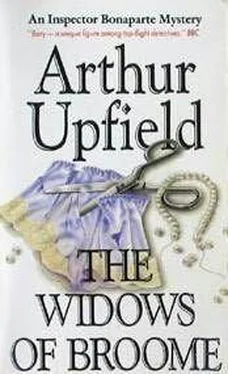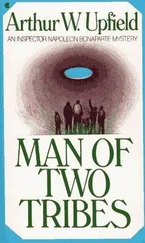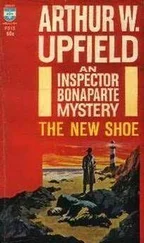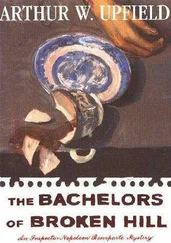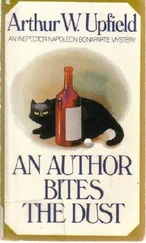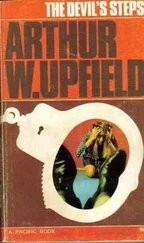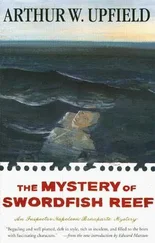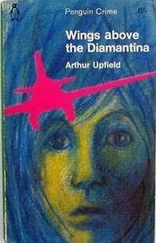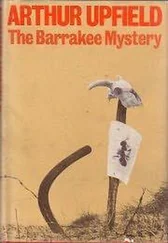Arthur Upfield - The Widows of broome
Здесь есть возможность читать онлайн «Arthur Upfield - The Widows of broome» весь текст электронной книги совершенно бесплатно (целиком полную версию без сокращений). В некоторых случаях можно слушать аудио, скачать через торрент в формате fb2 и присутствует краткое содержание. Жанр: Классический детектив, на английском языке. Описание произведения, (предисловие) а так же отзывы посетителей доступны на портале библиотеки ЛибКат.
- Название:The Widows of broome
- Автор:
- Жанр:
- Год:неизвестен
- ISBN:нет данных
- Рейтинг книги:5 / 5. Голосов: 1
-
Избранное:Добавить в избранное
- Отзывы:
-
Ваша оценка:
- 100
- 1
- 2
- 3
- 4
- 5
The Widows of broome: краткое содержание, описание и аннотация
Предлагаем к чтению аннотацию, описание, краткое содержание или предисловие (зависит от того, что написал сам автор книги «The Widows of broome»). Если вы не нашли необходимую информацию о книге — напишите в комментариях, мы постараемся отыскать её.
The Widows of broome — читать онлайн бесплатно полную книгу (весь текст) целиком
Ниже представлен текст книги, разбитый по страницам. Система сохранения места последней прочитанной страницы, позволяет с удобством читать онлайн бесплатно книгу «The Widows of broome», без необходимости каждый раз заново искать на чём Вы остановились. Поставьте закладку, и сможете в любой момент перейти на страницу, на которой закончили чтение.
Интервал:
Закладка:
A man was packing shell into a crate. There was another man, his back to Bony, who was kneeling beside the bin containing the largest-size shell, and Bony watched him select a shell, hold it to catch the light, and then press its cool, silken surface to his cheek.
Johnno spoke in his own language to the shell packer, and the kneeling man turned, the shell still pressed to his cheek. His dark eyes flared with resentment on seeing Bony and, tossing the shell back upon the heap, he hastily rose to his feet, spoke sharply to the packer and strode from the shed.
Mr. Arthur Flinn surely loved the touch of pearl… and silk?
Chapter Nineteen
The Dingo Must Drink
THE man packing the shell was a Chinese in middle age. His fingers were long and tapering, and as each piece was placed in the stout wooden crate the fingers seemed to croon their farewell. To one side was a stack of crates stencilled with initials and the words NEW YORK, and in a corner were long sacks of shell as brought ashore from the luggers.
“Here my friend,” proudly announced Johnno. “Hetake us fishing. He has nice motor-boat.”
“May go out on Saturday,” the packer said without accent. “You’ll be welcome.”
“I shall be glad to go out if I can manage it. Thank you. What’s your name?”
“Bill Lung. What’s yours?”
“Alfred Knapp,” replied Bony. “Merely visiting, you know. Interesting place, Broome. Lot of shell here?”
“Little to what it was before the war. Only a few luggers working these days.”
The fingers had not ceased their employment, lifting the shell from the near-by floor bin and expertly placing it in the crate. Now and then a shell would be discarded, being tossed into one or other of the remaining bins.
Johnno explained that Bill Lung was a real Australian, having been born in Broome, and having all his life worked in a packing shed. Bill Lung’s expression remained bland throughout until Johnno mentioned an Australian wife and eight children. Then the large face expanded roundly into a happy smile.
The Javanese was a born exhibitor. Having exhibited Bill Lung, and doing his best with Bony, he exhibited the contents of the shed, explaining the various grades into which the men at the heap of shell sorted it. The bin marked Extra Heavy was Johnno’s show piece. Before this bin had knelt Arthur Flinn, and now Bony knelt and picked up specimen shells measuring from six to seven inches across and gleaming withan opalescent lustre shading to pale gold along the edges. As Flinn had done, Bony pressed a plate of pearl to his cheek and, feeling its cool silky caress, fancied he could hear the sighing wind making love to the tropic seas. Bill Lung’s fingers momentarily stopped work, and into the narrow eyescrept a furtive smile of sympathetic understanding.
Johnno sprang up and regarded his wristlet watch with dramatic dismay.
“I go,” he exclaimed. “I have to arrive and take lady totoptown store. I see you sometime, eh? P’hapsSaturday. You tell Bill anytime you go fishing. We have good time. Now I go to arrive.”
He hurried away, and the Chinese selected a shell and presented it to Bony.
“Take it home, and when trouble comes to you, look at it and touch it and let it tell you its secrets.”
“What do these shells tell you, Bill Lung?”
“Of things which are beyond dreams.”
“Things which send some men mad.”
“There’s always the weaklings, Mr. Knapp… men who smoke too much, or eat too much, or dream too much. My illustrious father used to say that to play with a snake is foolishness, and to run from it is cowardice. It is wisdom to kill the snake and wear its skin as your girdle.”
“Your father was a wise man,” Bony said. “Well, I’ll get along. If you have room for me in your boat, I’ll try to make the trip. And thank you. Tell me, before I go, which would you choose, a pearl or a diamond?”
“I’d choose the pearl.”
“Why?”
“For what it tells me through my fingers. A pearl is alive: a diamond is dead and can’t speak. My father used to say: ‘Select for a bride the woman who prefers pearls to diamonds. The woman who loves pearls will bear you many children.’ ”
Bony smiled down at the packer:
“I bet your bride preferred pearls,” he said. “Mine did.”
Leaving the shed, he sauntered along the coast road, passing the Seahorse Hotel, and, when a hundred yards beyond it, he left the road and climbed the coast sand-dunes. On the summit he sat gazing out over Roebuc Bay with its fringe of green mangroves. The tide was high, and the near Indian Ocean was placid and delphinium-blue. The long white jetty seemed to be straining to reach the pavement of gold laid down by the westering sun.
A lugger was anchored at the mouth of the creek and the high voices of the men aboard her reached Bony, bringinga nostalgia for the open sea and the great game-fish inhabiting it. Far out another lugger was headed for the bay, a stubby black pencil on a silver-grey slate.
That Chinese shell packer was not an oddity in Australia. Bony had met many like him, men born in Australia of Chinese parents and educated in Australian schools. They spoke English fluently and the language of their parents indifferently, and they invariably appended with great success the old civilisation to the new. Bill Lung was an epicure of the senses rather than a sensualist.
That he loved the feel of pearl shell was unashamedly revealed by those crooning fingers. Bony wondered what had been in the mind of the Chinese as he watched Flinn handle and caress the shells of pearl. Mr. Arthur Flinn was certainly a large piece of the material being gathered by Bony. With but little more in his possession, Bony would see his picture of the murderer.
Without standing, he turned himself about and was presented with a picture of the town. The first impression was an extensive jumble of iron roofs laid flat on a floor of tree foliage. Then the eye discerned the wide roadways criss-crossing the area within the curve of Dampier Creek. Beyond the creek to the southward the land was grey-green and featureless as far as the distant fringe of paper-bark scrub. Beyond the town to the north-east lay the open spaces of the airport with its buildings and radio mast, and toward the ocean the white-painted mission buildings and the college, occupying the highest point of Broome.
Like the placid ocean, Broome appeared languorous. Down in the road, or street, skirting the protective sand-dune, were but two men and three children. There were several people on the veranda of the Seahorse Hotel, and two cars were parked without. In the yard of the hotel, clothes hung motionless on a line. Bony’s gaze passed over the town, noting clothes drying at four places, and he was reminded of the coming night and the responsibilities it would bring.
Slithering down the slope of the dune, Bony emptied his shoes of sand and walked briskly that he would not delay the evening meal. When approaching the police station, Keith came to meet him.
“Can’t find Abie,” the boy said. “I’ve been scouting around for him, too.”
“He might have gone bush,” surmised Bony. “Black trackers often do, you know. I wouldn’t be surprised, though, if he turned up in time to draw his dinner at the kitchen.”
“That’s likely, Mr. Knapp. The blacks always seem to be hanging around at meal times. I asked Sister King if she had seen Abie, and she said perhaps he’s cleared off to a quiet camp to have a good go at the petrol.”
“Oh! Who is Sister King?”
“Sister King’s up at the Mission. The blacks go there, you know, for clothes and things. A lot of the black kids live there. The Sisters make ’emgo to their school.”
Читать дальшеИнтервал:
Закладка:
Похожие книги на «The Widows of broome»
Представляем Вашему вниманию похожие книги на «The Widows of broome» списком для выбора. Мы отобрали схожую по названию и смыслу литературу в надежде предоставить читателям больше вариантов отыскать новые, интересные, ещё непрочитанные произведения.
Обсуждение, отзывы о книге «The Widows of broome» и просто собственные мнения читателей. Оставьте ваши комментарии, напишите, что Вы думаете о произведении, его смысле или главных героях. Укажите что конкретно понравилось, а что нет, и почему Вы так считаете.
